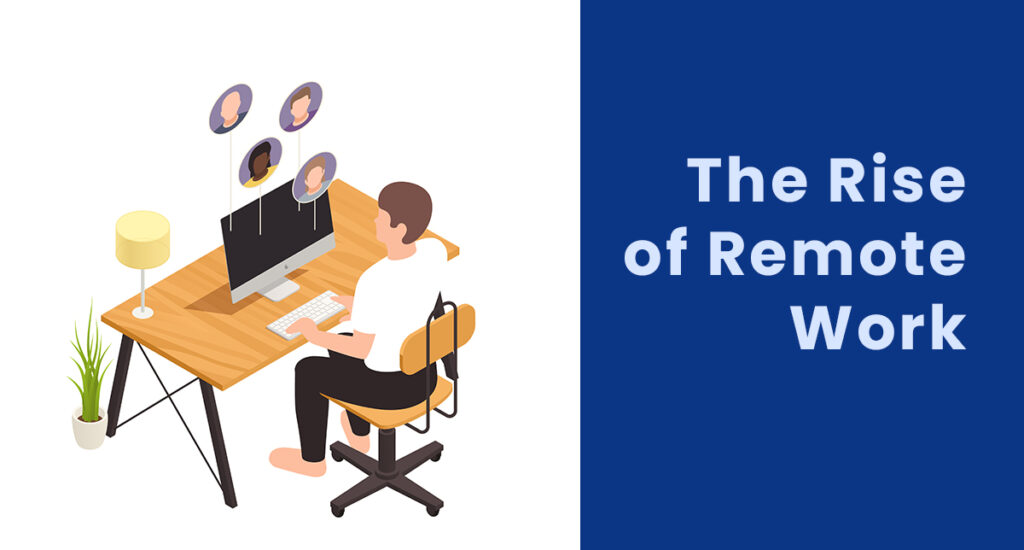
The future of work is an ever-evolving concept shaped by several factors, including technological advancements, altering demographics, and economic shifts. As businesses look to stay ahead of the curve, they need to understand how the future of work will impact staffing and recruitment. In this article, we’ll explore the implications of the end of employment for staffing and recruitment, including the rise of remote work, the need for new skills, and the importance of diversity and inclusion.

One of the most significant changes that the future of work has brought is the rise of remote work. Due to the COVID-19 pandemic, many businesses have had to adjust to remote work practices in recent years.
Many of these practices are likely to continue even after the pandemic subsides. Remote work has a variety of implications for staffing and recruitment.
Firstly, it expands the pool of potential candidates. When a company can hire employees from anywhere in the world, they’re not limited to a particular geographic area. This means they can find the best talent, regardless of location. However, it also means that there’s more competition for these candidates. Companies must proactively recruit and create compelling job descriptions and employer branding to attract the best talent.
Secondly, remote work requires a different set of skills. Employees who work remotely need to be self-motivated, able to work independently, and comfortable using technology to communicate and collaborate. As such, when recruiting remote workers, looking for candidates who have these skills and can thrive in a remote work environment is essential.
Thirdly, remote work requires a different approach to management. Managers must trust their employees to work independently and effectively communicate and collaborate with their team members. As such, when hiring remote workers, it’s essential to look for candidates who have experience working remotely and can demonstrate that they can work well in a remote team.

The future of work is also bringing a need for new skills. Automation and artificial intelligence are rapidly changing the job market, and many jobs today may not exist in the future. At the same time, new jobs are emerging that require skills that may have yet to be in demand.
One of the most crucial skills that will be in demand in the future is digital literacy. As businesses become more reliant on technology, employees must be comfortable using various digital tools and platforms. This includes basic computer skills to much more advanced coding and data analysis skills.
Another skill that will be in demand in the future is creativity. As automation takes over more routine tasks, humans must focus on tasks that require creativity and problem-solving. This means that employees will need to be able to think critically and come up with innovative solutions to complex problems.
Finally, soft skills such as communication, collaboration, and emotional intelligence will be increasingly important. As remote work becomes more common, employees must be able to communicate effectively and build strong relationships with their team members. Additionally, as workplaces become more diverse, employees will need to be able to navigate cultural differences and work well with people from different backgrounds.

The future of work is also bringing a renewed focus on diversity and inclusion. As the workforce becomes more diverse, companies prioritizing diversity and inclusion will be able to attract and retain top talent. Research has shown that various teams are more innovative and perform better than homogeneous teams.
When hiring for diversity and inclusion, it is crucial to establish a culture that values these factors. This includes everything from ensuring that job descriptions use inclusive language to providing training on unconscious bias for hiring managers.
Additionally, utilizing all recruitment channels ensures your outreach reaches a diverse pool of talented candidates. This might include attending job fairs at colleges and universities with a diverse student body, partnering with organizations supporting underrepresented groups in the workforce, and using job boards and social media platforms catering to diverse communities.
Once a diverse pool of candidates has been identified, ensuring the hiring process is fair and equitable is critical. All candidates should be evaluated based on their qualifications and potential, regardless of race, gender, or other demographic factors. It’s also crucial to ensure that the interview process is standardized and that all candidates are asked the same questions.
Finally, it’s integral to ensure that the workplace itself is inclusive. This means creating a culture where all employees feel valued and respected, and everyone has an equal opportunity to succeed. This might include offering diversity and inclusion training for all employees, establishing employee resource groups for underrepresented groups, and creating policies that support work-life balance and employee well being.

The COVID-19 pandemic has drastically accelerated the trend toward remote work, but even before the pandemic, remote work was on the rise. According to a report produced by Global Workplace Analytics, the number of people who worked remotely at least part-time increased by 159% between 2005 and 2017. And even as the pandemic subsides, remote work will likely remain a significant part of the workforce.
The implications of remote work for staffing and recruitment are significant. As mentioned earlier, remote work expands the pool of potential candidates, but it also requires a different approach to management. Managers must trust their employees to work independently and communicate effectively, even in other locations. In order to support remote work, businesses need to invest in technology and tools like video conferencing software, project management software, and cloud-based document sharing.
The ability for businesses to reduce costs associated with office space and other expenses is one of the significant benefits of remote work. It’s crucial to remember that working remotely has its own set of particular difficulties. For example, remote workers may feel isolated or disconnected from their team, and it can be more challenging to build strong relationships and collaborate effectively when working remotely. To overcome these challenges, companies must create a strong culture supporting remote workers and fostering communication and collaboration.

The future of work is bringing a need for new skills as automation and artificial intelligence change the nature of work. For example, routine tasks that can be automated are likely to be eliminated, while jobs that require creativity, problem-solving, and emotional intelligence are likely to become more critical.
Digital literacy has proven to be a highly sought-after skill. As businesses become more reliant on technology, employees must be comfortable using various digital tools and platforms. Employees will need to be able to adapt to new technologies and learn new skills quickly as the technology landscape continues to evolve.
Another skill that will be in demand in the future is critical thinking. As automation takes over more routine tasks, humans must focus on tasks that require creativity and problem-solving. This means that employees will need to be able to think critically and come up with innovative solutions to complex problems.
Finally, soft skills such as communication, collaboration, and emotional intelligence will be increasingly important. As remote work becomes more common, employees must be able to communicate effectively and build strong relationships with their team members.

Teams with diversity exhibit more incredible innovation and outperform groups with homogeneity, according to Research. A diverse workforce can also aid businesses in better understanding their clients and developing goods and services that satisfy their requirements.
Companies must foster a culture that values diversity and inclusion to develop a diverse and inclusive workforce. This means ensuring that job descriptions use inclusive language, providing training on unconscious bias for hiring managers, and creating policies that support work-life balance and employee well-being.
To access a wide range of candidates, businesses must use a variety of recruitment channels. This might include attending job fairs at colleges and universities with a diverse student body, partnering with organizations supporting underrepresented groups in the workforce, and using job boards and social media platforms catering to diverse communities.
Once a diverse pool of candidates has been identified, ensuring the hiring process is fair and equitable is essential. All candidates should be evaluated based on their qualifications and potential, regardless of race, gender, or other demographic factors. This can be accomplished by using blind hiring techniques, such as removing identifying information from resumes and applications.
Finally, it’s essential to ensure that the workplace itself is inclusive. This means creating a culture where all employees feel valued and respected, and everyone has an equal opportunity to succeed. This might include offering diversity and inclusion training for all employees, establishing employee resource groups for underrepresented groups, and creating policies that support work-life balance and employee well-being.
Another important aspect of diversity and inclusion is pay equity. Research has shown that women and people of color are often compensated less than their white male counterparts, even when they have the same qualifications and experience. Companies must ensure fair and transparent pay practices based on job responsibilities, not demographic factors.
In addition to these steps, companies can also consider implementing diversity quotas or goals. While some argue that these policies can lead to reverse discrimination, others believe they can help companies take concrete steps to create a more diverse and inclusive workforce.
Conclusion
The future of work is an exciting but challenging time for businesses. As technology advances and demographics shift, companies need to be prepared to adapt and evolve. This means understanding the implications of the future of work for staffing and recruitment, including the rise of remote work, the need for new skills, and the importance of diversity and inclusion.
Businesses must be proactive in their recruitment efforts and foster an inclusive workplace culture to succeed in the future of work. To do this, various recruitment channels must be used to reach a diverse pool of applicants. Additionally, the hiring procedure must be fair and equitable, and a culture that promotes work-life harmony and employee wellbeing must be established. By doing this, they will be better positioned to draw in top talent, keep it, and succeed in a market undergoing rapid change.

1260 Centennial Ave, Suite 1A,
Piscataway NJ 08854
Email Us:
info@emonics.com
Call Us :
Useful Links Submit a Resume Trademarks & Legal Statement Privacy Policy Site Pages Site Search